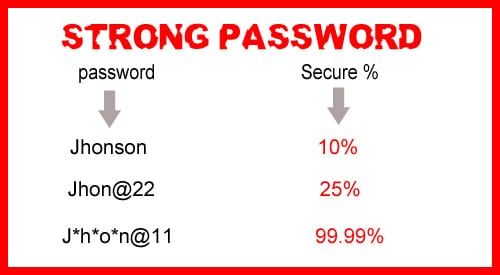

- #Which are examples of strong passwords how to#
- #Which are examples of strong passwords password#
- #Which are examples of strong passwords crack#
#Which are examples of strong passwords password#
Do not use words that can be found in any dictionary of any language.Īfter choosing a password that's easy to remember but difficult for others to guess, do not write it down and leave it someplace where others can find it.Do not use passwords that are based on personal information that can be easily accessed or guessed.Consider using a password manager program to keep track of your passwords.Develop mnemonics to remember complex passwords.Use the longest password or passphrase permissible by each password system.Use different passwords on different systems and accounts.Use the following techniques to develop unique passwords for each of your accounts: If attackers guess your password, they would have access to your other accounts with the same password. Once you've come up with a strong, memorable password it's tempting to reuse it-don't! Reusing a password, even a strong one, endangers your accounts just as much as using a weak password. Avoid common phrases, famous quotations, and song lyrics. You may need to try different variations of a passphrase-for example, some applications limit the length of passwords and some do not accept spaces or certain special characters. For example, "Pattern2baseball#4mYmiemale!" would be a strong password because it has 28 characters and includes the upper and lowercase letters, numbers, and special characters. According to NIST guidance, you should consider using the longest password or passphrase permissible (8-64 characters) when you can. The National Institute of Standards and Technology (NIST) has developed specific guidelines for strong passwords. Changing the same example used above to "Il!2pBb." creates a password very different from any dictionary word. For example, instead of the password "hoops," use "IlTpbb" for " ike o lay asketall." Using both lowercase and capital letters adds another layer of obscurity.

#Which are examples of strong passwords how to#
What about your email password-is it a word that can be found in the dictionary? If so, it may be susceptible to dictionary attacks, which attempt to guess passwords based on common words or phrases.Īlthough intentionally misspelling a word ("daytt" instead of "date") may offer some protection against dictionary attacks, an even better method is to rely on a series of words and use memory techniques, or mnemonics, to help you remember how to decode it. Is yours a combination of the month, day, or year of your birthday? Does it contain your address or phone number? Think about how easy it is to find someone's birthday or similar information.
#Which are examples of strong passwords crack#
However, that also makes it easier for an attacker to crack them. Most people use passwords that are based on personal information and are easy to remember. Once a system is compromised, it is open to exploitation by other unwanted sources. Many systems and services have been successfully breached because of non-secure and inadequate passwords. Passwords are the most common means of authentication, but only work if they are complex and confidential. This authentication process is more important and more difficult in the cyber world. Verifying that those requesting access are the people they claim to be is the next step. One of the best ways to protect information or physical property is to ensure that only authorized people have access to it. Often, an attack is not specifically about your account, but about using the access to your information to launch a larger attack. Tracking all of the number, letter, and word combinations may be frustrating, but these protections are important because hackers represent a real threat to your information. You probably use personal identification numbers (PINs), passwords, or passphrases every day: from getting money from the ATM or using your debit card in a store, to logging in to your email or into an online retailer.


 0 kommentar(er)
0 kommentar(er)
